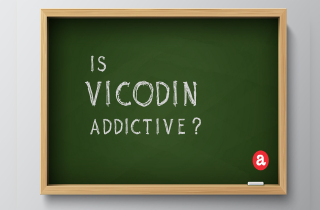What is Vicodin?
Vicodin is the brand name for a legal painkiller that contains hydrocodone. Vicodin is an opioid, which is a medical term for a man made synthetic opiate, that is usually administered in tablet form and is currently a Schedule III controlled substance and regulated by the Controlled Substances Act. Vicodin is used to manage acute or chronic pain, relieve coughing, and can be prescribed as an anti diarrhea medicine. For more on the medical and non medical uses of Vicodin, we review vicodin use and vicodin uses.
Who can get addicted to Vicodin?
Doctors expect people who take Vicodin to become physiologically dependent on the prescription pain reliever. It is one of the side effects of long term use of Vicodin for pain. However, physical dependence and addiction are different. Addiction always has an element of psychological AND physical dependence on a drug. But are some people more prone to becoming addicted to Vicodin than others?
Chemical vs. psychological dependence on Vicodin
As a person becomes physically dependent on a drug like Vicodin, they may develop other symptoms of addiction, including psychological dependence. In fact, a small minority of people will become addicted to Vicodin when predisposing factors trigger psychological dependence on the drug. When this occurs, drug use can increase beyond the initial intended use. But it is not only unsuspecting patients who become addicted to Vicodin. Additionally, people already diagnosed with addiction disorders can become quickly addicted to Vicodin. Some addicts may already seek the prescription pills for non medical uses.
Vicodin addiction characteristics
Vicodin addiction is a bodily, mental (and spiritual) chemical dependence on the drug hydrocodone. People who become addicted to Vicodin display at least one of four characteristic traits of addiction. These addiction traits are used by doctors, psychiatrists, counselor, and addiction professionals when diagnosing any kind of addiction, including addiction to Vicodin. The characteristics of addiction are:
Addiction is a primary, chronic, neurobiologic disease with genetic, psychosocial, and environmental factors influencing its development and manifestations. Addiction is characterized by behaviors that include one or more of the following:
• Impaired control over drug use
• Compulsive use
• Continued use despite harm
• CravingsFrom: Graham, A.W.; Schultz, T.K.; Mayo-Smith, M.F.; Ries, R.K.; and Wilford, B.B., eds. Principles of Addiction Medicine, Third Edition. Chevy Chase, MD: American Society of Addiction Medicine, Inc., 2003.
Learn more about the signs and symptoms of Vicodin addiction here.
The addictive nature of Vicodin & social change
As a medication, Vicodin can be habit forming. The medical establishment knows this. Further, doctors know that Vicodin can be misused, abused or “diverted” to addicts.
So are doctors legally selling drugs that should be illegal? And should doctors be culpable for the growing trend of Vicodin addiction? Finally, what risk does Vicodin addiction pose to our society? If hydrocodone impairs the mental and/or physical abilities of users, should we be screening our work places, schools, and governments for Vicodin use?









Related Posts